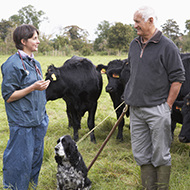
BVA responds to Agricultural Transition Plan update.
BVA president James Russell has responded to the Government's updated Agriculture Transition Plan, stating that annual vet visits will be a ‘crucial first step’ in improving farm animal health and welfare.
Under the update announced on Wednesday (30 June), environment secretary George Eustice pledged to fund a yearly veterinary visit to eligible farms through the Annual Health and Welfare review.
The move is designed ‘to better understand the health and welfare of the national herd and flock and help to target future support in the right way.’
Responding, BVA president James Russell said: “The real win here is that for the first time the Government in England is recognising animal health and welfare as a public good that will attract public funds.
“The annual vet visits will be a crucial first step in delivering the ultimate aim of improving the health and welfare of the nation’s herds and flocks. It’s essential that the programme builds on, and strengthens existing farmer-vet relationships. "
He continued: “We know there are some animals that currently have no access to veterinary healthcare and we welcome this opportunity to reach those farms so we can bring veterinary value to improving health, welfare and productivity.
“There is much more detail to be worked out and BVA is actively working with government and farmers to co-design what this looks like in practice. We welcome this first step that will help us to understand the bigger picture on health and welfare so we can target our efforts to make improvements on priority diseases.”



 The Veterinary Medicines Directorate (VMD) is inviting applications from veterinary students to attend a one-week extramural studies (EMS) placement in July 2026.
The Veterinary Medicines Directorate (VMD) is inviting applications from veterinary students to attend a one-week extramural studies (EMS) placement in July 2026.